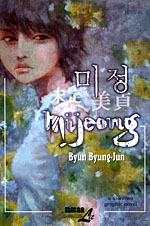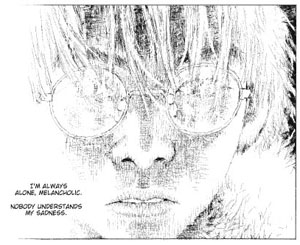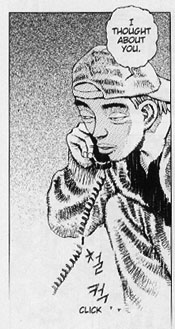 By Byun Byung-Jun
By Byun Byung-Jun
240 pages, black and white with some color pages
Published by NBM
Assembling a book of short stories—be it by a single creator or an anthology—is a delicate undertaking. You can’t front load the book with the best material because if the weaker pieces are all at the end, you run the risk of the final impression for the reader being disappointment. On the other hand, saving the best pieces for the end has its own problems, where the early entries aren’t strong enough to have someone continue to read the book. All of this came to mind for me when reading Byun Byung-Jun’s Mijeong, a collection of the author’s short pieces. At the end of the day, I can’t help but think that whomever decided the order of this book could have done a slightly better job.
The title story of Mijeong is also its lead, about an observer trying to adjust to this new world he’s entered. "Mijeong" has the most beautiful art in the book; with delicate thin lines placed together that sometimes seem to give the impression of form more than actual concrete images, if that makes sense.  It’s gorgeous to look at, but is also saddled with one of the most pretentious narrations I’ve read in a long time. "I’m always alone, melancholic," the protagonist thinks. "Nobody understands my sadness." The writing is so juvenile and in love with itself that I almost put Mijeong down after this opening piece, and it was less than 20 pages long. It’s a horrible opening to Mijeong, and I wonder if there was any reason other than it being the titular story that it got that spot of honor. Frustratingly, the second piece ("Yeon-du, seventeen years old") has both the weakest art and the second-weakest story in the book as well, and at 60 pages in length I can understand if anyone gave up on the book by this point in time. Byun’s certainly not making a good first or even second impression with this one-two punch of underwhelming stories.
It’s gorgeous to look at, but is also saddled with one of the most pretentious narrations I’ve read in a long time. "I’m always alone, melancholic," the protagonist thinks. "Nobody understands my sadness." The writing is so juvenile and in love with itself that I almost put Mijeong down after this opening piece, and it was less than 20 pages long. It’s a horrible opening to Mijeong, and I wonder if there was any reason other than it being the titular story that it got that spot of honor. Frustratingly, the second piece ("Yeon-du, seventeen years old") has both the weakest art and the second-weakest story in the book as well, and at 60 pages in length I can understand if anyone gave up on the book by this point in time. Byun’s certainly not making a good first or even second impression with this one-two punch of underwhelming stories.
Thankfully, the book takes a turn for the better at this point. "Utility" (written by Yun In-wan) reminded me a lot of short stories by writer and director Etgar Keret, with its quirky characters and situations. There’s something oddly compelling about its lead character who keeps trying to use a sink-or-swim technique (or should it be fall-or-fly?) on baby chickens to jumpstart their knowledge of flying. It’s an odd but effective introduction to the character, and from there things get stranger as an attempt to preserve the family honor of a friend leads to a particularly macabre debate. It’s a sharp and memorable vignette, and while it might not be a story for the ages, it’s strong enough to restore the faith enough to continue reading Mijeong.
 The remaining stories are all enjoyable, little tales of wish fulfillment, searching, and even a love triangle where one of the members is a cat. None of them particularly blew me away, but I found myself becoming more appreciative of Byun’s storytelling. Some of these later pieces should have appeared earlier, if only to help assure a casual reader that Byun had some good stories up his sleeve. I feel bad that they’re buried in the back, because there’s a good chance that the reader will miss them. Most of Byun’s art looks good here, too. It’s not as strong as that initial opener, but his textured surfaces have a strange, almost tubular look to them and it’s an attractive final product. The one color story in the center of the volume is particularly attractive; if I had to guess I’d say he used watercolors over rough pencils, and what Byun gives up in fine details he more than makes up for with rich, deep hues.
The remaining stories are all enjoyable, little tales of wish fulfillment, searching, and even a love triangle where one of the members is a cat. None of them particularly blew me away, but I found myself becoming more appreciative of Byun’s storytelling. Some of these later pieces should have appeared earlier, if only to help assure a casual reader that Byun had some good stories up his sleeve. I feel bad that they’re buried in the back, because there’s a good chance that the reader will miss them. Most of Byun’s art looks good here, too. It’s not as strong as that initial opener, but his textured surfaces have a strange, almost tubular look to them and it’s an attractive final product. The one color story in the center of the volume is particularly attractive; if I had to guess I’d say he used watercolors over rough pencils, and what Byun gives up in fine details he more than makes up for with rich, deep hues.
I’m glad I read Mijeong, but I really wish someone along the chain of publication had swapped some of these stories around. It’s such a weak opening that I think it’s a logical assumption to make that Byun’s work isn’t quite your cup of tea. The reality, though, is that while Mijeong takes a while to get going, there are some very nice surprises waiting for the reader.
Purchase Links: Amazon.com | Powell’s Books
